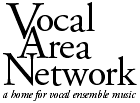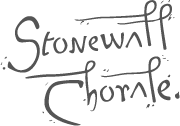 |
 |
Advertise | Sustaining Membership | VAN Store | Feedback
by Mark Scarbrough for Vocal Area Network
Posted March 12, 2005
 How
do you keep a non-profit, non-professional, non-endowed chorale running for
almost thirty years? No, not practice, practice, practice. Instead, it takes the
good will of a committed membership to build an organization that will outlast
your own tenure there.
How
do you keep a non-profit, non-professional, non-endowed chorale running for
almost thirty years? No, not practice, practice, practice. Instead, it takes the
good will of a committed membership to build an organization that will outlast
your own tenure there.
The Stonewall Chorale was founded in 1977 in New York City as the nation's first gay and lesbian chorale. While you may think it has a built-in audience, it in fact gives concerts in what is surely the most chorale-choked corner of the country. Want to do a Messiah in December? Try being an all-volunteer choir and competing among the fifty or so professional ones doing the same rep, all charging about the same for tickets. Yet the Stonewall Chorale, with an annual budget of no more than $60k, has managed to thrive in this full-throat environment. How did that happen?
Of course, there's luck: being in the right place at the right time. And the right place is among its members. So the chorale has used its members as its best resource. Is someone the vice-president of a local bank? Maybe they'd like to have us sing at lunch one day? Is someone's partner a ranking member of a law firm? Maybe they could get the firm to donate to the next concert?
The chorale's board, made up only of the chorale's members, has a revolving constituency. While there are no official term limits, the chorale has a history of changing its board every three years or so. This allows new ideas and new energy to circulate. New ideas don't come to the fore on their own. With a changing board, they must or the organization will falter. That ever-changing board also allows the leadership to exist outside a cult of personality. In any performing group, there's a tendency to run things on the polish of several members. It never proves a good long-term strategy: people leave, become disillusioned, get tired. Changing the board's membership ensures that the chorale, not the personality of its members, remains the focus of the work.
The board could never have been so active without someone to coordinate its tasks. So there's a board member who traffics the other jobs. She figures out what needs to be done and then enforces a schedule among those concerned. It's a thankless job but makes for a wonderfully efficient system.
The chorale has also had a series of presidents who have been less concerned with the chorale's day-to-day details and more so with the big picture-which mostly means being concerned with the ineffable concept of community. These presidents have recognized that the Stonewall Chorale is a labor of love among its members and donors; they have made sure the chorale is a place where its members feel affirmed, not derided or fatigued.
Sad to say, but chorale members who have to drag themselves through the Ave Verum Corpus for the tenth time are usually not energized members. So the Stonewall Chorale has a formal repertory committee, headed by the Artistic Director, but staffed by members, most of whom are not on the board. The Artistic Director has the only vote on the committee, but the membership has a way to voice its concerns and offer new works. This season, the chorale is presenting an April concert that includes a brand-new Bassi work (Harpsonnets), a Caribbean-inspired piece (Chilcott's The Making of the Drum), and Vivaldi's Gloria in D (a piece the chorale has not performed in a dozen years).
The Stonewall Chorale also continues to find new ways to finance its work. Two years ago, the board began an instrument underwriting program. Donors can pick a specific instrument and underwrite it, either in someone's name or their own. "First Violin: Mark Smith. Tonight, Mr. Smith's performance has been underwritten in the memory of Leslie Jones by a generous contribution from Mr. and Mrs. Jack Brown."
Of course, none of these structures would work without a committed artistic director. Because the board runs in a functionary capacity, the chorale can take advantage of a director's personality, both to drive its internal energy and to connect with the audience. Our current director, Cynthia Powell, is a whiz at both. We were happy to hire someone whose personality would drive the group into a new era because we knew we had a solid structure behind her.
In the end, keeping a non-profit running proves a task beyond any of its individual members, even its artistic director. The success of the Stonewall Chorale has been directly related to its internal community. Simply put, its members are committed to its future.
Mark Scarbrough writes about food and travel and is the president of The Stonewall Chorale. This is his first article for Vocal Area Network.